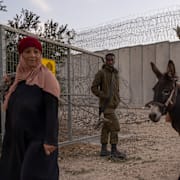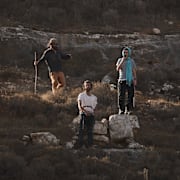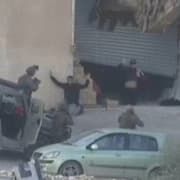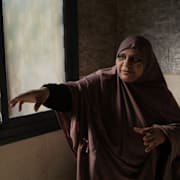
Israel stänger FN-skolor på ockuperat område
Israel har stängt tre skolor som drivs i FN-regi i ockuperade östra Jerusalem, rapporterar AFP.
På torsdagsmorgonen samlades tungt beväpnade israeliska soldater runt skolorna som bedriver undervisning för hundratals elever. Över 500 av dem var närvarande när skolorna stängdes.
– Det är en traumatisk upplevelse för de här unga människorna, säger Roland Friedrich, chef för FN-organet Unrwa på Västbanken.
Redan för flera månader sedan meddelade Israel att skolornas verksamhet förbjuds.
Internationella domstolen definierar Israels annektering av östra Jerusalem som en olaglig ockupation.
bakgrund
Östra Jerusalem
Wikipedia (en)
East Jerusalem (Arabic: القدس الشرقية, al-Quds ash-Sharqiya; Hebrew: מִזְרַח יְרוּשָׁלַיִם, Mizraḥ Yerushalayim) is the portion of Jerusalem that was held by Jordan after the 1948 Arab–Israeli War, as opposed to West Jerusalem, which was held by Israel. Captured and occupied in 1967, this area was unilaterally annexed by Israel in 1980. Under international law, East Jerusalem is considered part of the West Bank, and Palestinian territories, and under illegal occupation by Israel. Many states recognize East Jerusalem as the capital of the State of Palestine (such as Brazil, China, Russia, and all 57 members of the Organisation of Islamic Cooperation), whereas other states (such as Australia, France and others) assert that East Jerusalem "will be the capital of Palestine", while referring to it as "an occupied territory". In 2020, East Jerusalem had a population of 595,000 inhabitants, of which 361,700 (61%) were Palestinian Arabs and 234,000 (39%) Jewish settlers. Israeli settlements in East Jerusalem are illegal under international law and in the eyes of the international community.
Jerusalem was envisaged as a separate, international city under the 1947 UN partition plan. It was, however, divided by the 1948 war that followed Israel's declaration of independence. As a result of the 1949 Armistice Agreements, the city's western half came under Israeli control, while its eastern half, containing the famed Old City, fell under Jordanian control, at the exception of Mount Scopus enclave. Israel occupied East Jerusalem during the 1967 Six-Day War; since then, the entire city has been under Israeli control. The 1980 Jerusalem Law declared unified Jerusalem the capital of Israel, formalizing the effective annexation of East Jerusalem. Palestinians and many in the international community consider East Jerusalem to be the future capital of the State of Palestine. The status of Jerusalem has been described as "one of the most intractable issues in the Israeli–Palestinian conflict", with conflicting claims to sovereignty over the city or parts of it, and access to its holy sites.
Israeli and Palestinian definitions of East Jerusalem differ. Following the 1967 Six-Day War, Jerusalem's municipal boundaries were extended totaling an area three times the size of pre-war West Jerusalem. This includes several West Bank villages to the north, east and south of the Old City that are now considered neighborhoods of the city, as well as eight suburban neighborhoods that were built since then. The international community considers these neighborhoods illegal settlements, but the Israeli government disputes this. The Israeli position is based on the extended municipal boundaries, while the Palestinian position is based on the 1949 Agreements.
East Jerusalem includes the Old City, which is home to many sites of seminal religious importance for the three major Abrahamic religions—Judaism, Christianity, and Islam, including the Temple Mount / Al-Aqsa, the Western Wall, the Dome of the Rock and the Church of the Holy Sepulchre. Arab residents of East Jerusalem are increasingly becoming integrated into Israeli society, in terms of education, citizenship, national service and other aspects.
Omni är politiskt obundna och oberoende. Vi strävar efter att ge fler perspektiv på nyheterna. Har du frågor eller synpunkter kring vår rapportering? Kontakta redaktionen



